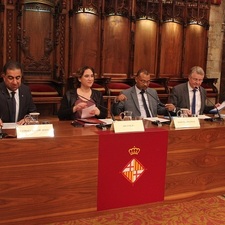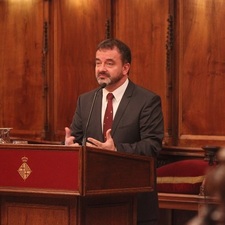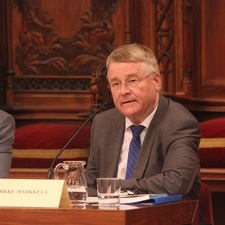The MedCities city network celebrates its 25th anniversary in Barcelona
Barcelona has been the Secretariat General for the organisation since 1996. Several member cities attended the commemorative event, including Malaga, Tunis, Tetouan and Dubrovnik
This morning, at the Barcelona City Hall, a commemorative event was held for the 25th anniversary of MedCities, the network of Mediterranean cities for sustainable urban development.
Since 1991, the organisation has offered support to local Mediterranean governments in drafting and planning city development strategies and implementing urban projects. Since its founding, Barcelona has played a central role in MedCities, holding the post of the secretariat general since 1996. Thus, the network has institutional, technical and financial support from AMB and the Barcelona City Council.
The event brought many mayors from member cities together in Barcelona, including Malaga, Tetouan, Tunis and Dubrovnik. It has also had the presence of high officials from the European Union, including Markku Markkula, co-president of the Euro-Mediterranean Regional and Local Assembly and president of the Committee of the Regions, and Ihab Fahmy, deputy secretary general of the Union for the Mediterranean.
Ada Colau presided over the event, as the mayor of Barcelona and AMB president, stressing that we must ‘urgently get to work without rest to obtain a more democratic Mediterranean in peace and without conflicts, which offers opportunities for everyone, that is environmentally more sustainable and that respects the rights of the most vulnerable people and groups'.
Making reference to the work that the AMB carries out through MedCities, Colau reminded us that: ‘Behind the great human dramas we see in the Mediterranean are cities that have to face daily problems like waste management, safety, mobility, water and energy efficiency. If we achieve inclusive and sustainable cities, we will be taking the first step towards a stable region with a future.'
Alfred Bosch, vice-president of AMB's International and Cooperation Division, added that ‘the urban matter in the Mediterranean is increasingly more a metropolitan matter', and sent out special thoughts for the Syrian cities of Aleppo and Latakia, with which the network had lost contact in recent years due to the war. In this regard, Bosch hopes to ‘work with them again when conditions allow. All aid and assistance will be necessary and we are ready to provide it on our part.'
Initially created as a platform for implementing projects in fields like the environment, mobility, public space, heritage, economic development and strategic urban planning, MedCities has now expanded its scope of action and is supporting the city councils in projects in other areas.
MedCities has also become an advocate for municipalism in the region, thanks to its work to place city councils at the centre of urban development. It has done extensive work to promote joint work between the city councils and all other stakeholders in cities, and to foster citizen participation in all of its actions.
Further, it has worked to integrate refugees from territories in conflict into the cities.
In its 25 years of history, MedCities has implemented dozens of projects, facilitating cooperation between cities to favour development in one region, the Mediterranean, which has experienced numerous difficulties in many fields. In many cases, MedCities has let cities connect daily challenges with opportunities for cooperation and networking, particularly via decentralised cooperation.
Since 1991, the organisation has offered support to local Mediterranean governments in drafting and planning city development strategies and implementing urban projects. Since its founding, Barcelona has played a central role in MedCities, holding the post of the secretariat general since 1996. Thus, the network has institutional, technical and financial support from AMB and the Barcelona City Council.
The event brought many mayors from member cities together in Barcelona, including Malaga, Tetouan, Tunis and Dubrovnik. It has also had the presence of high officials from the European Union, including Markku Markkula, co-president of the Euro-Mediterranean Regional and Local Assembly and president of the Committee of the Regions, and Ihab Fahmy, deputy secretary general of the Union for the Mediterranean.
Ada Colau presided over the event, as the mayor of Barcelona and AMB president, stressing that we must ‘urgently get to work without rest to obtain a more democratic Mediterranean in peace and without conflicts, which offers opportunities for everyone, that is environmentally more sustainable and that respects the rights of the most vulnerable people and groups'.
Making reference to the work that the AMB carries out through MedCities, Colau reminded us that: ‘Behind the great human dramas we see in the Mediterranean are cities that have to face daily problems like waste management, safety, mobility, water and energy efficiency. If we achieve inclusive and sustainable cities, we will be taking the first step towards a stable region with a future.'
Alfred Bosch, vice-president of AMB's International and Cooperation Division, added that ‘the urban matter in the Mediterranean is increasingly more a metropolitan matter', and sent out special thoughts for the Syrian cities of Aleppo and Latakia, with which the network had lost contact in recent years due to the war. In this regard, Bosch hopes to ‘work with them again when conditions allow. All aid and assistance will be necessary and we are ready to provide it on our part.'
Initially created as a platform for implementing projects in fields like the environment, mobility, public space, heritage, economic development and strategic urban planning, MedCities has now expanded its scope of action and is supporting the city councils in projects in other areas.
MedCities has also become an advocate for municipalism in the region, thanks to its work to place city councils at the centre of urban development. It has done extensive work to promote joint work between the city councils and all other stakeholders in cities, and to foster citizen participation in all of its actions.
Further, it has worked to integrate refugees from territories in conflict into the cities.
In its 25 years of history, MedCities has implemented dozens of projects, facilitating cooperation between cities to favour development in one region, the Mediterranean, which has experienced numerous difficulties in many fields. In many cases, MedCities has let cities connect daily challenges with opportunities for cooperation and networking, particularly via decentralised cooperation.















































